“The Way to Eden”
Written by Michael Richards and Arthur Heinemann
Directed by David Alexander
Season 3, Episode 20
Production episode 60043-75
Original air date: February 21, 1969
Stardate: 5832.3
Captain’s log. The Enterprise is pursuing the Aurora, which was stolen and is heading for Romulan space. Sulu puts them in a tractor beam, but the ship resists the beam, overheating their engines. Scotty beams them out before the Aurora goes boom, and they’re all dressed in loose, exposed clothes, holding their hands up in a circle.
SPACE HIPPIES!
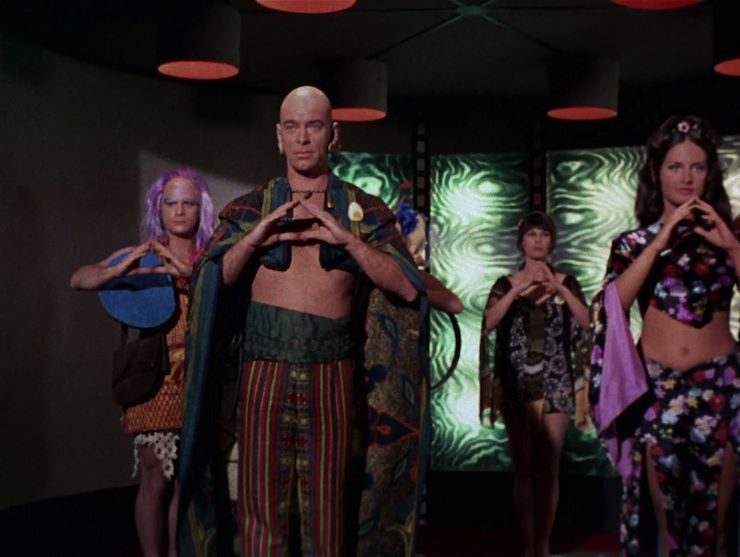
One of the space hippies is Tongo Rad, the son of the Catullan ambassador. Kirk is under orders to treat Rad and his friends with kid gloves, so he doesn’t arrest them, instead treating them as guests. They respond by having a sit-in, refusing to go anywhere and referring to anyone who disagrees with them as “Herbert.” Spock actually able to speak the space hippie lingo and get through to them. Their leader, Dr. Sevrin, rejects Federation authority and demands to be taken to Eden, which Kirk dismisses as a myth.
Chekov recognizes the voice of one of the space hippies as his ex-girlfriend from Starfleet Academy, Irina Galliulin. He goes to see her in sickbay, where McCoy is giving all six of the space hippies a checkup. Adam, one of the space hippies, sings a song while they wait. Galliulin and Chekov have an awkward reunion. It’s obvious they both still care for each other, but also that they both live their lives differently.
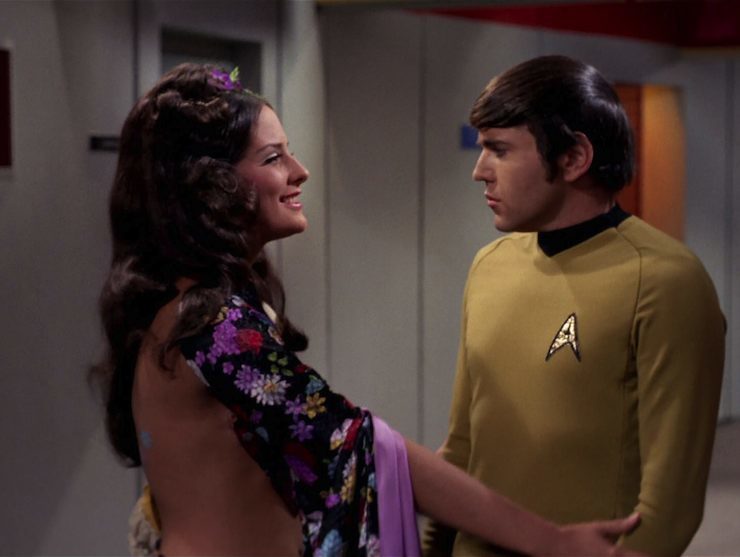
McCoy reveals that Sevrin is a carrier of synthococcus novae, a disease that was created in the sterile environments of space ships, starbases, and artificial atmospheres. Sevrin needs to be quarantined while McCoy checks to make sure everyone’s immunizations are up to date. Sevrin denies it, claiming it’s a conspiracy to lock him up, but McCoy calls bullshit, as Sevrin is a scientist who knew damn well what he had. Putting him on a starship with 400 people is dangerous enough; putting him on a primitive world like Eden would make him Typhoid Mary.
The space hippies have free rein of the ship thanks to Rad’s father’s influence, and they’re using it to incite disaffection. Spock tries to plead with Sevrin to get them to stop disrupting the ship, offering to help them find Eden and to petition the Federation on their behalf to allow colonization—but if they continue to disrupt the Enterprise, Kirk will be forced to bring criminal charges, and that would skotch any colonization plans.
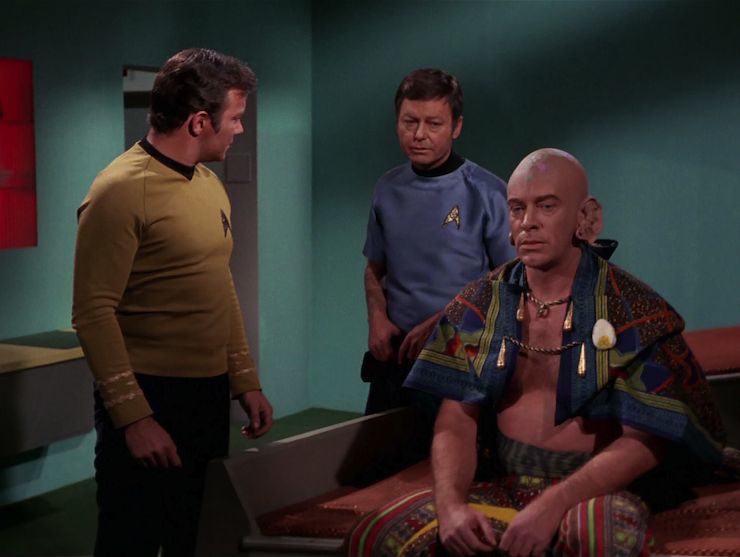
Sevrin admits finally that he did know he had the disease, and he resents that he is restricted to artificial atmospheres to keep it from spreading, as it’s artificial atmospheres that bred his disease in the first place. He wishes to go to a primitive planet to cleanse himself. But he does agree to ask his people to not be such pains in the ass.
Spock goes to Kirk and declares that Sevrin is insane—but the movement isn’t, and he wishes to keep his promise to Sevrin to find Eden. Spock works in his quarters, assisted by Chekov in auxiliary control; the former is approached by Adam about having a concert, the latter joined by Galliulin, who wishes to apologize for teasing him earlier. She doesn’t want Chekov to disapprove of her, but he’s pretty much always going to. However, even as he explains how navigation works, they wind up smooching.
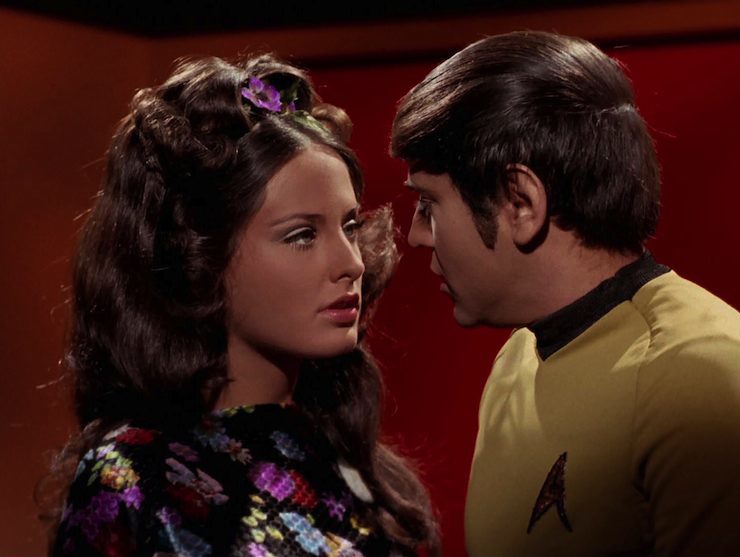
How-some-ever, there’s a cunning plan at work. Galliulin was pumping Chekov for information, and Rad and Adam were working on getting Sulu and Spock on their side. They obviously plan to take over the ship.
Adam’s concert still happens, and it’s quite a hit—not just in the rec room where they play, but we see Sevrin’s security guard and both Sulu and one of Scotty’s engineers on the bridge bopping to the music. Spock jams with them on his Vulcan harp, also.
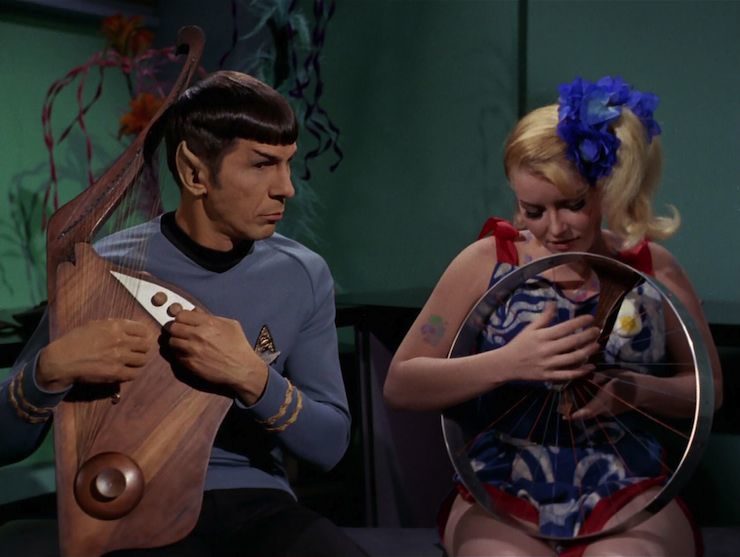
Rad knocks out Sevrin’s security guard and frees him, then they head to auxiliary control and take out the officer stationed there. They quickly take control of the ship, because that’s totally convincing, and takes the ship toward Eden—which also has them going into Romulan space. Kirk urges them to give the ship back, but Sevrin threatens to destroy the ship if they do anything to stop them.
Spock and Chekov’s work bears fruit, and the computer has calculated the likely location of Eden. Sevrin sets the ship’s circuits to let out a sonic pulse that will kill everyone on board (though he assures Galliulin that it will only stun them), and uses it when Scotty tries to break into auxiliary control. Sevrin and his people take a shuttlecraft down; Kirk manages to turn off the ultrasonics before everyone is killed.
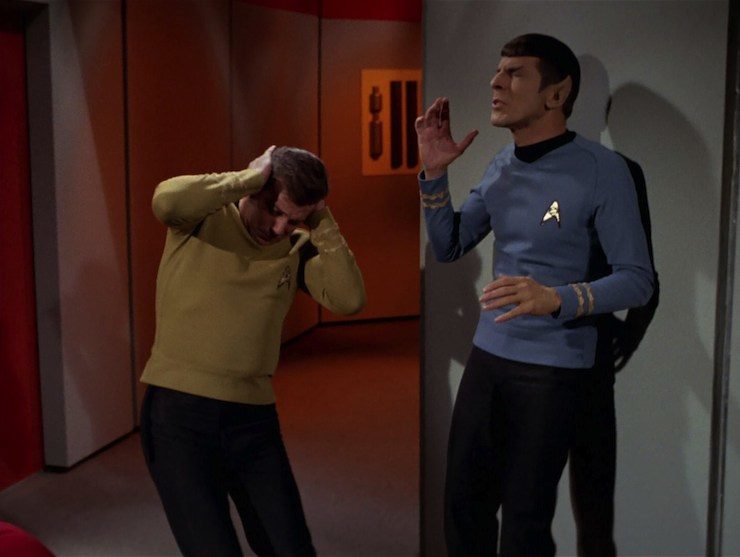
Kirk, Spock, McCoy, and Chekov beam down to Eden, which has no animal life (beyond the half-dozen space hippies), but is quite beautiful. However, the plant life turns out to be full of acid, even the grass. Spock finds Adam’s body next to a fruit with a bite taken out of it—the fruit is poisonous. Spock also takes the time out to remind us that this guy in a paradise called Eden who just ate a fruit that killed him is named Adam because we really don’t want you to miss the bog-obvious metaphor!!!!!!
The rest of the space hippies are on the shuttlecraft, as their bare feet are all burned from the acid in the grass. Sevrin refuses to beam back to the Enterprise, instead deliberately eating a fruit and dying.
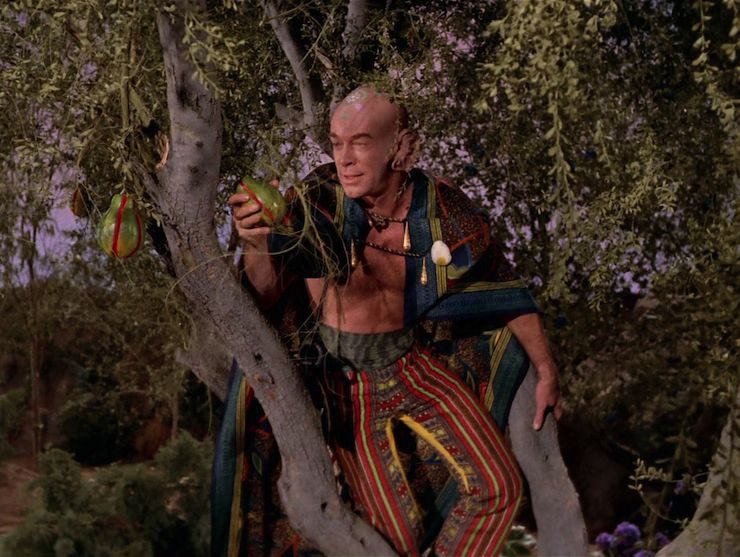
They make it out of Romulan space without incident and take the four surviving space hippies to starbase. Chekov submits himself for disciplinary action, but Kirk lets him off the hook, and then Galliulin gives him a final smooch.
Can’t we just reverse the polarity? Apparently, the science of artificial environments has created a deadly virus. That kinda sucks.
Fascinating. For reasons having nothing to do with common sense and everything to do with Spock being the show’s breakout character, Spock totally understands and can communicate with the space hippies. The same character who has constantly decried the illogic and emotionalism of humans is perfectly comfortable hanging out with extremely illogical, hyper-emotional people. Sure. (Yes, he says he gets the notion of people who feel alien, but Jesus…)
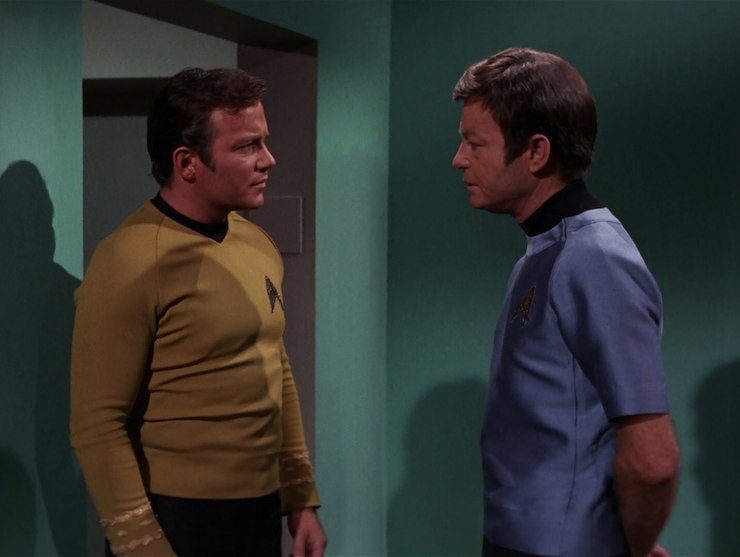
I’m a doctor not an escalator. McCoy is the one who diagnoses Sevrin with synthococcus novae, and he’s particularly obnoxious about it, probably in response to Sevrin’s obdurate response to being examined.
Ahead warp one, aye. Sulu is very receptive to the space hippies’ notion, accepting a flower from one and bopping to the concert.
It’s a Russian invention. We learn Chekov’s middle name/patronymic: Andreivitch, which means his father’s name is Andrei.
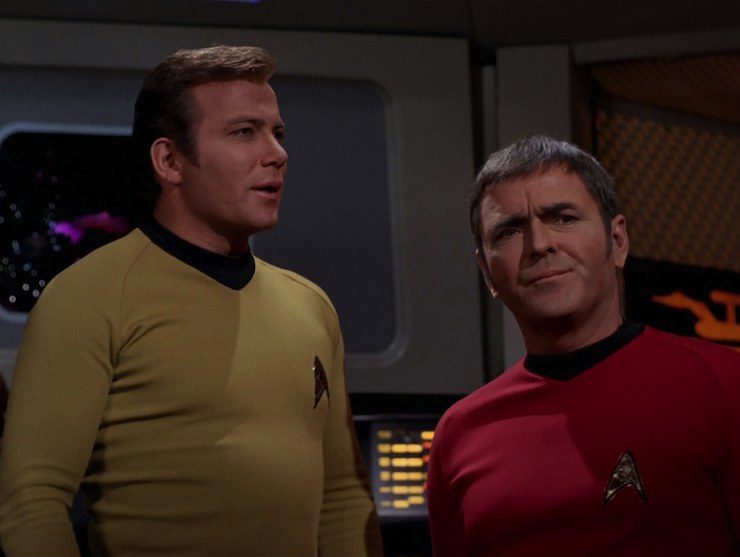
I cannot change the laws of physics! Scotty is disapproving of the space hippies from jump, bitching and moaning about these kids today with their music and their hair, and pretty much doing every stereotypical old-fart bit short of shaking his fist at them and telling them to get off his lawn. His plaintive query as to why being young means being irresponsible is met with an amused rejoinder by Kirk, reminding him that he did some crazy stuff when he was young, and didn’t Scotty, also? (We saw him do a drunken pub crawl in “Wolf in the Fold,” so we don’t even have to go back to his youth…)
Go put on a red shirt. The security guard on Sevrin is so captivated by the music that he doesn’t hear Rad coming up the ladder and coming up behind him. One assumes he got demoted—or drummed out of Starfleet. I mean, seriously, the guy had one job…
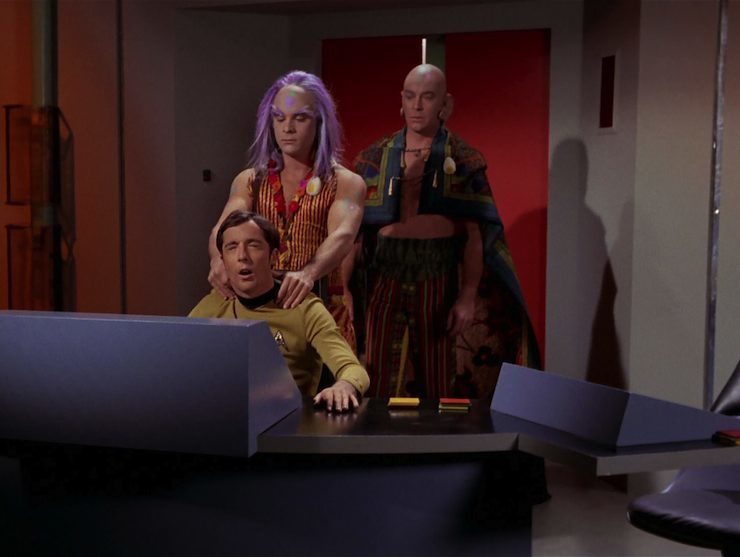
No sex, please, we’re Starfleet. Chekov and Galliulin have a fascinating relationship, as it’s obvious they’re totally crazy about each other, but just as obvious that they’d kill each other if they tried to make it into a real relationship.
Channel open. “Be incorrect, occasionally.”
“And you be correct.”
“Occasionally.”
Galliulin and Chekov each agreeing to give the other’s kink a try sometimes.
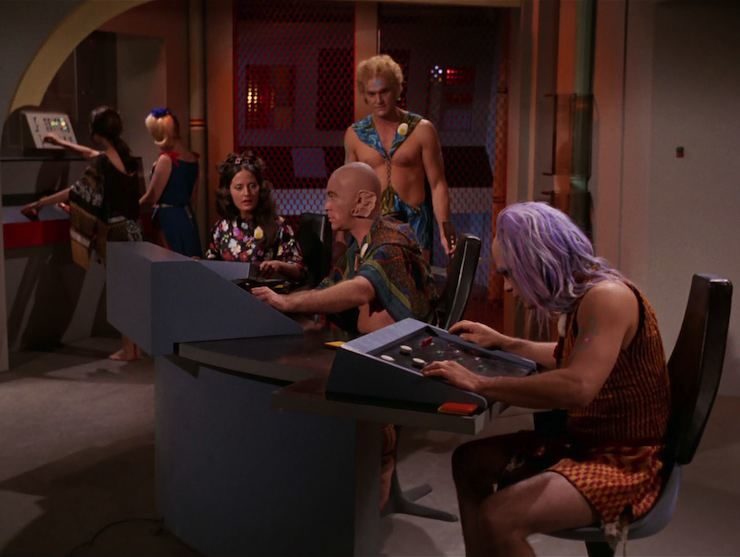
Welcome aboard. Several returning guests in this one: Skip Homeier, last seen as Melakon in “Patterns of Force,” returns as Sevrin. Victor Brandt, last seen as Watson in “Elaan of Troyius,” plays Rad. Phyllis Douglas, last seen as Mears in “The Galileo Seven,” is back as Second Hippie On The Right. Elizabeth Rogers makes her second appearance as Palmer, following “The Doomsday Machine.” And then we have Charles Napier as Adam, who will return on DS9 as General Denning in “Little Green Men,” a role a hundred and eighty degrees from this one.
Plus there’s Mary-Linda Rapelye as Galliulin, Deborah Downey as First Hippie On the Right, and recurring regulars George Takei, James Doohan, Walter Koenig, and Majel Barrett.
Trivial matters: This story started out life as a script entitled “Joanna” by D.C. Fontana. The role that eventually became Galliulin was McCoy’s titular daughter and she was set up as a love interest for Kirk. However, Fred Freiberger rejected the script, and it was given to Arthur Heinemann to heavily rewrite. Fontana was sufficiently grumpy about the rewrite that she once again asked for the “Michael Richards” pseudonym as her credit, just as she did with “That Which Survives.”
Joanna McCoy was actually part of the season two writers bible for the series, after Fontana and DeForest Kelley discussed the notion of McCoy having a daughter by a previous marriage. The marriage wasn’t established onscreen until the 2009 Star Trek, and the closest Joanna was to being established was a brief reference to McCoy’s daughter in the animated episode “The Survivor.” Joanna does appear in the novels Crisis on Centaurus by Brad Ferguson, Crucible: Provenance of Shadows by David R. George III, Legacies: Best Defense by David Mack, and the novelization Encounter at Farpoint by David Gerrold, as well as the comic books Year Four: The Enterprise Experiment by D.C. Fontana, Derek Chester, & Gordon Purcell and Untold Voyages #3 by Glenn Greenberg & Mike Collins.
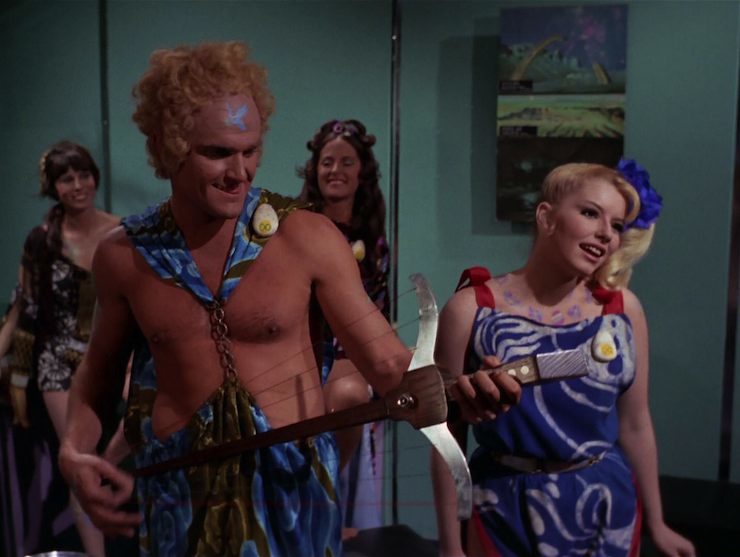
Much of the music in the episode was composed by Deborah Downey, who was rewarded with a role that included singing a duet with Charles Napier and faking a duet on alien instruments with Leonard Nimoy. She was assisted by scripter Arthur Heinemann, who wrote the lyrics, and Napier. Downey has made many convention appearances over the years, including a couple that I also attended as a guest, and she is an absolute sweetheart. Definitely worth talking to if you’re ever at a con she’s a guest at.
Several tie-in novels mention later attempts by Chekov and Galliulin to rekindle their relationship, including regular rewatch commenter Christopher L. Bennett’s Ex Machina (which had Chekov taking a leave of absence from Starfleet to try to work things out with her, one of several theories put forth to explain Chekov’s absence from the animated series) and J.M. Dillard’s novelizations of Star Trek VI: The Undiscovered Country and Star Trek Generations.
Rad later appeared as an adult during DC’s first monthly Star Trek comic, in issue #46 by Mike Carlin, Tom Sutton, & Ricardo Villagran.
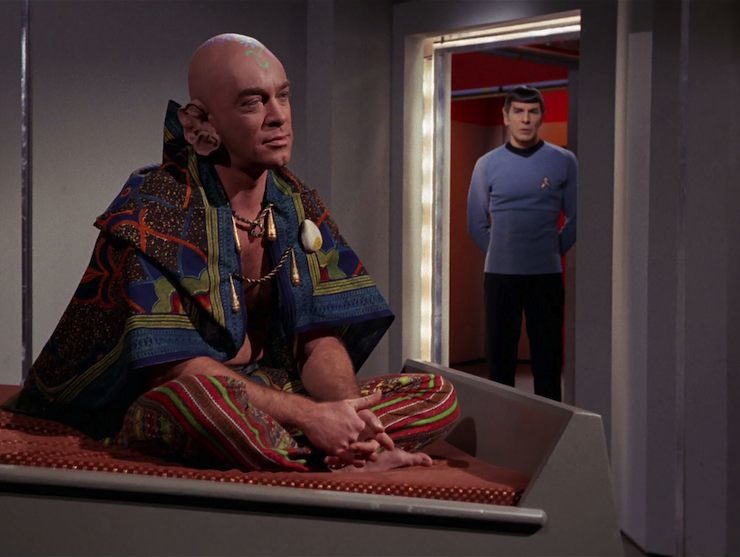
To boldly go. “Gonna crack my knuckles and jump for joy / I got a clean bill of health from Dr. McCoy!” SPACE HIPPIES!
Seriously, someone actually thought this was a good idea. Not that this is anything new. It’s always entertaining to watch writers try to take on a subculture they don’t actually know a damn thing about, and they’ve been doing it badly forever. (Ask someone who is actually part of the BDSM community about Fifty Shades of Gray some time, I dare you…) And Arthur Heinemann’s take on the hippie movement is laughably simplistic. We get the basic trappings—the clothing styles, the love of music, the nose-thumbing of authority—but the context is lost. Sevrin is the only one who has a real reason for it, thanks to the disease he’s contracted.
But the counterculture of the 1960s had its roots in the oppressiveness that permeated the 1950s, with the Kefauver hearings on juvenile delinquency and the McCarthy hearings on “un-American” activities and the unrest both before and after the passing of the Civil Rights Act in 1964, not to mention the U.S. getting involved in wars in Asia that had much less clear-cut motives than the previous World Wars.
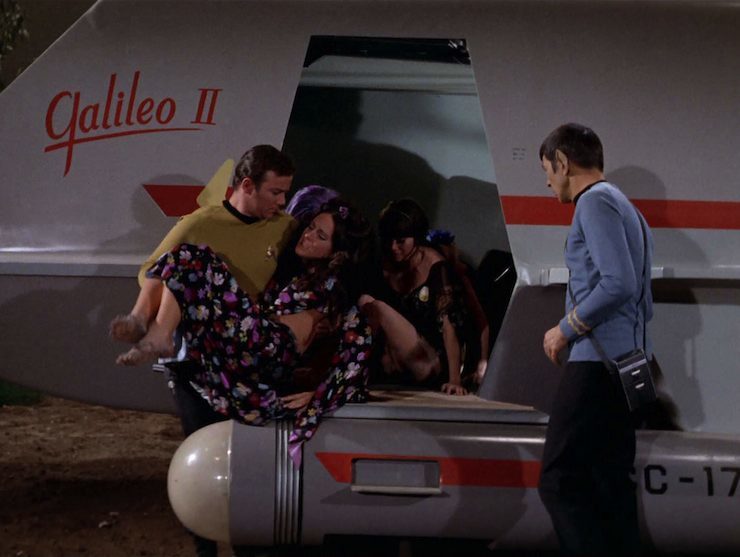
None of that context is present here, it’s just people in skimpy clothes and bare feet, with flowers painted on their skin, playing music and being all goofy for absolutely no good reason. Of course, the mainstream insisted that that was the case for the hippies, that they were just doing it to be stupid youths, but it was far more complicated than that. Yet by buying into that myth, the Trek producers reveal themselves to be a bunch of Herberts.
And Spock reaches! Because, why, exactly? Nothing in his personality over the previous three seasons gives any indication that he’d have anything but contempt for rabble-rousing emotionalism, yet here he is making a circle with his fingers and proving that he isn’t a Herbert.
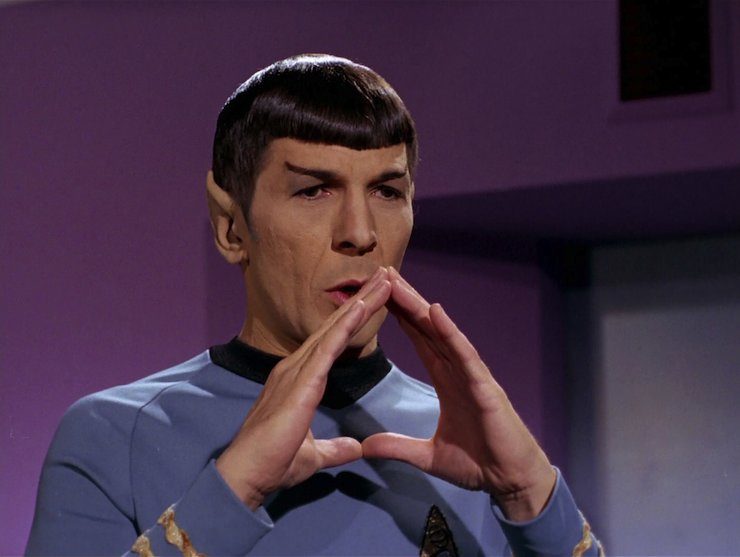
Meanwhile we have Chekov, who was specifically cast to inject youthful enthusiasm into the show, who has a good sense of humor, whom we have seen flirting with women in the past, all of a sudden sledgehammered into the role of stick-in-the-mud. It would have made much more sense to have Chekov be the one who serves as the go-between, as the youngest person on the ship and one who knows them, and see him be tempted by the lifestyle, and maybe establish that he was also tempted back in the Academy, and maybe introduce a conflict, instead of just giving Leonard Nimoy more screen time.
As with “The Cloud Minders,” we have a story that had a much more interesting original pitch than it did a final product, and while this isn’t as irritating as last week’s, it’s still pretty disappointing that we don’t get to meet McCoy’s daughter and watch Kirk hit on her. Besides the ill-defined movement, we’ve got a Romulan threat that never goes anywhere except for some ho-hum artificial suspense, plus we’re supposed to believe that good music is enough to distract the entire crew enough to allow six people to take over the ship. Also it really shouldn’t be that easy to take over the ship from auxiliary control when you’re not even in Starfleet!
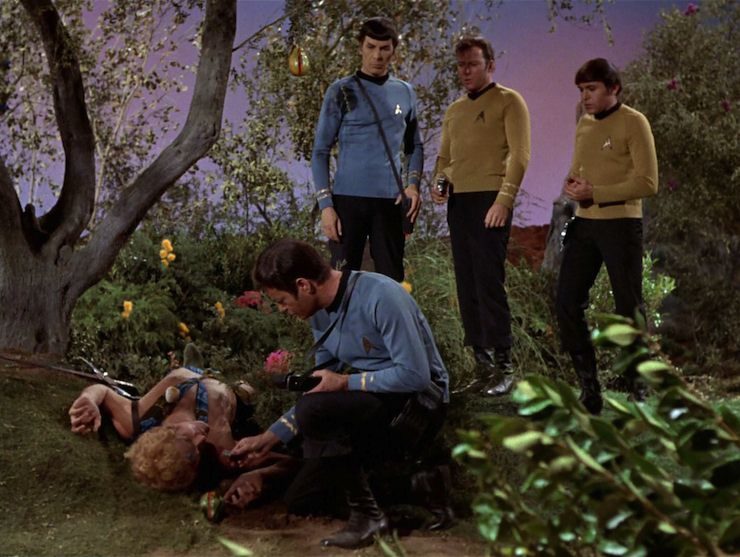
The episode has its moments—Skip Homeier’s portrayal of Sevrin is actually pretty good (though his psychotic break at the end is poorly done), Charles Napier has a superb singing voice (and in general, the songs are fun, at least), and I like the very Twilight Zone-esque twist that Eden is actually deadly to human life.
But overall, this is the episode with the space hippies. Nothing more need be said.
Warp factor rating: 3
Next week: “Requiem for Methuselah”
Keith R.A. DeCandido is no Herbert. Do we reach?










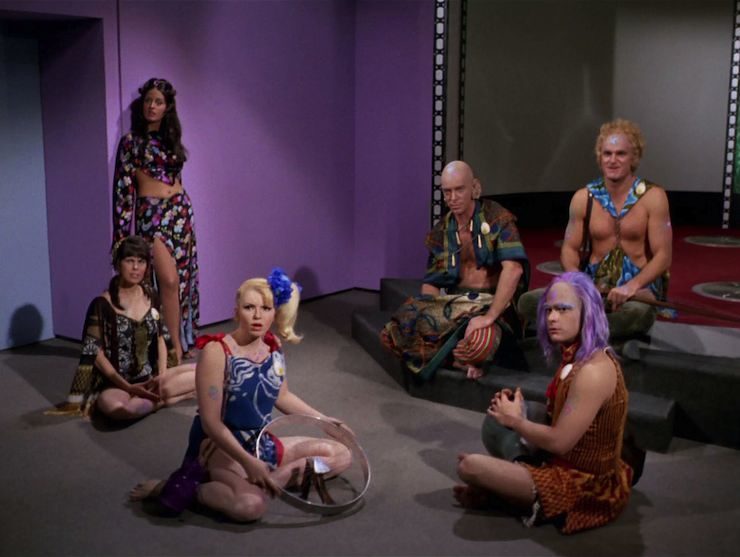
Yeah, not much to add. Thanks for mentioning my Ex Machina callback to this episode.
I’m a bit puzzled about the credits for the songs. The La-La Land Records box set of TOS music credits the songs to Arthur Heinemann, Charles Napier, and guitarist Craig Robertson. Deborah Downey is listed only as a vocalist on “Hey, Out There!” And the instrumental track “Far Out Jam” (which I believe was playing during the ship-takeover scenes) was composed and performed by session guitarist William Pitman.
Despite its conceptual flaws, this episode did provide a bit more fleshing out of the Federation, introducing the Tiburons and Catullans. We’d see a Tiburon or two in Deep Space Nine (with a row of small forehead bumps in addition to accurate recreations of Sevrin-style ears), but I don’t think we’ve seen Catullans again outside the literature. It’s interesting that Catullans seem to have their own equivalent of the Vulcan neck pinch, involving touching the thumbs to the sides of the neck. I think I explained that in one of my books as some kind of psionic attack, though in retrospect I think I would’ve gone with an injected venom as the explanation.
Hm. I admit I have not watched this one in a while, but I don’t remember finding it difficult at all to think that Spock would “reach” the Eden-seekers when the others would or could not. As you point out, he says something about knowing what it’s like to be an outsider. It seems a certain kind of logical that he’d try to appreciate a different subculture instead of dismissing it out of hand. But I’ll have to reconsider that when I watch it again.
I remember reading somewhere that Walter Koenig was very unhappy with the direction of this episode… or was that “Gamesters of Triskelion”?
I’m convinced that Sevrin is meant to be a Timothy Leary analog, which makes me wonder if the bit with the acid at the end is supposed to be symbolic. Anyway, for all its flaws the episode is actually a useful tool for looking at a lot of the mainstream attitudes toward the counterculture at the time. It had been a year-and-a-half since the summer of love, but that had also been the long, hot summer, and it was still 6 months to Woodstock. People were mostly getting their views from the news, and what little they saw that wasn’t violent involved drugs and a general rejection of what they had grown up believing. In some ways, the political divide was worse than it is today, but it was more generational than it is now.
You can make a case for Chekov being so unusually uptight, because he has a connection to these people and he’s worried about it reflecting on him in some way. He’s just trying to be super by the book. Maybe he’s got a performance review coming up.
And that instrument circular instrument is clearly a bakery cake slicer, used to get uniform slices to sell.
I like the space hippies’ hard boiled egg badges
@2/Mike: I do seem to recall Koenig complaining about this episode, for the same reason Keith mentions — that Chekov is completely out of character, that he was meant to be the one who was more relaxed and fun and “incorrect” than the more seasoned officers around him, and yet here he was just the opposite. (I tried to reconcile that in Ex Machina somewhat.)
I would guess that when they changed the character of Joanna McCoy to Irina, Chekov’s ex-girlfriend, they shoehorned Chekov into McCoy’s role in the script, basically. Makes more sense for a father, especially an older one, to be a stick-in-the-mud toward his seemingly rebellious daughter. As others have said, it doesn’t make sense for Chekov to be the proverbial wet blanket.
I’m old enough to remember seeing TOS in its first run, but I didn’t see this episode until the mid-80s. I distinctly remember “WTF, Space Hippies?” and both laughing and cringing throughout the episode.
This one breaks a lot of rules; Spock, Chekov, general ship security and common sense. I would have been nice to Rad because of his connections, but the other clowns are going in the brig for aiding and abetting the theft of the Aurora. He’s Captain Effing Kirk; Ambassadors exist to be dissed.
In my book this is the worst third season episode, although I still dislike Wolf in the Fold and The Omega Glory a bit more.
“But the counterculture of the 1960s had its roots in the oppressiveness that permeated the 1950s” – Yes, that’s the problem. Star Trek is allegedly set in a better world, so where do these people come from? Surely not from the same place as their forerunners in the 20th century? Also, they’re portrayed as irresponsible rich kids – stealing a shuttlecraft, violating the Neutral Zone and getting away with it because one of them is an ambassador’s son.
When I think of this episode, I also think of a scene in Marge Piercy’s novel Vida where the title character, a radical anti-war activist during the ’60s and ’70s, remembers that she used to see herself as someone from Star Trek, coming from a more enlightened future and merely on a short, bumpy mission to a primitive planet. I may be mistaken, but I’m under the impression that Star Trek was rather popular among people who were young and critical of society. So this episode could be seen as a case of Star Trek insulting its fanbase.
I like last week’s episode better. Droxine’s decision to go to the mines is a far more sympathetic portrayal of a young person who questions authority than anything in this episode.
Oh well. At least we get to know Chekov’s patronymic.
@8/Jana: “I may be mistaken, but I’m under the impression that Star Trek was rather popular among people who were young and critical of society. So this episode could be seen as a case of Star Trek insulting its fanbase.”
Yeah, they really mis-gauged their audience there.
“Oh well. At least we get to know Chekov’s patronymic.”
And yet, in the book Star Trek II Biographies, William Rotsler claimed that Pavel Andreievich Chekov’s father was named Alexei. I guess he didn’t get the whole “patronymic” thing. (He also “explained” Khan recognizing Chekov by saying that Khan had memorized every face in Starfleet’s personnel records. And I think his Scotty chapter implied that warp drive had been invented in Scotty’s lifetime, which is kind of overlooking the whole “Zefram Cochrane disappeared 150 years ago!” thing. There was some bizarre stuff in that book, although it did coin Uhura’s now-canonical first name.)
Goofy episode, but I dig Adam’s, uh, crossbow… guitar… harp instrument. Does that thing have a name?
I just find it ironic that Charles Napier would go on to specialize in playing, well, ultra-Herberts — hard-nosed, conservative, generally military authority figures who’d have no patience for the likes of Adam. This is the first role I knew him from, but it’s the diametric opposite of what would become his bread and butter as an actor.
Quoth ragnarredbeard: “He’s Captain Effing Kirk; Ambassadors exist to be dissed.”
Actually, no, they don’t. As I’ve tirelessly tried to point out in this rewatch, Kirk is NOT an orders-disobeying maverick who thumbs his nose at authority. He always obeys orders, sometimes — e.g., “The Galileo Seven” — to a fault. He won’t always be happy about it — e.g., “The Trouble with Tribbles” — but he still does as he’s told. Always. He only actually disobeyed orders twice in the TV show, in “The Doomsday Machine” (and those orders came from a batshit crazy Decker) and “Amok Time” (when Spock’s life was at stake). That’s it.
So no, the Kirk of the actual TV show that aired 50 years ago would never ever disobey orders.
—Keith R.A. DeCandido
Sevrin’s disease predates what some believe is the cause of various allergies, such as gluten, nuts, perfume, and one my niece has that I can’t remember but really limits her diet- the allegedly oversterilized, non-natural lives we lead that are too disconnected from Nature. Maybe allergies simply have a higher awareness now.
I wanted to holler “why are you taking the girls out from the shuttle back to the surface?!” at Kirk on the planet.
And if I had been a crewmember who knew Rad was aware of the sonics’ lethality, I would’ve seriously considered trying to separate his purple-haired head from his body.
@12 grad – Also Balace of Terror.
KIRK: What you do not know and must be told is that my command orders on this subject are precise and inviolable. No act, no provocation
KIRK [OC]: Will be considered sufficient reason to violate the zone. We may defend ourselves,
KIRK [OC]: But if necessary to avoid interspace war,
[Bridge]
KIRK: Both these outposts and this vessel will be considered expendable. Captain out.
And then later
KIRK: Lieutenant Uhura, inform Command base, In my opinion, no option. On my responsibility, we are proceeding into the Neutral Zone.
@14/kkozoriz: That wasn’t being insubordinate, though. A lot of people misunderstand this. TOS was based on the model of the British Navy in the 19th century, when captains in the field would be out of contact with their superiors for months at a time and would thus have the sole responsibility to make decisions about how to apply law and policy in the situations they encountered. That included the responsibility and the right to interpret orders. People who don’t understand that mistake Kirk’s authority to interpret orders as being a renegade, but it’s the same authority and responsibility that any other captain would have had to interpret or change orders to fit the situation when no higher authority was available to make that choice.
But he has that responsibility in those cases because he is the most senior authority figure in a position to respond to the situation. That makes a case like “Balance of Terror” different from a case like “The Doomsday Machine” or “The Galileo Seven” where a superior is right there on the bridge giving him orders. In those cases, he defers to the higher authority, while in other situations where he is the highest available authority, he makes the decisions and reports them to Command, with the understanding that he may have to face a penalty for it later if Command decides his choice was unjustified. Because that’s how a chain of command works.
This is another one where I really like David Morgan-Mar’s take:
http://www.mezzacotta.net/planetofhats/episodes/0077.html
I am pretty sure this is my least favorite episode of the show. It’s completely out of character with the rest of the series. “Alternative Factor,” “Spock’s Brain,” other common “worst” episodes at least fit in with the theme of TOS. This is just what the bloody hell to me. The concert feels like I’m watching Annette Funicello and Frankie Avalon.
If I never watch this again, it will be too soon. Not enough LSD in the world.
Also, Irina’s last name should be Galliulina. Only men from her family would be Galliulin. (Even Memory Alpha notes it’s properly Ирина Галиулина – with the “A” on the end.)
#17 Don’t you mean ‘LDS’? ;-)
15. ChristopherLBennett – I never said he was being insubordinate. I was simply pointing out a time he was prepared to violate a direct order not to cross the Neutral Zone.
Of course, they played it up as being a really BIG DEAL if someone did but nothing ever came of the various times that the Enterprise did so. The Deadly Years, The Enterprise Incident and this one as well. The Romulans don’t even bother to show up this time. It’s like they went “Oh big deal. So the Enterprise crossed the zone again. What else is new?” And that’s just one ship over a space of three years. Who knows how many other ships did so as well.
A pretty forgettable episode but some interesting bits n it. A little background on Chekov. Spock of all people being the one that most understands the hippies. The idea that there’s people who actually don’t want to live in the Federation and the disbelief among our intrepid crew that such a thing is possible. Some interesting nuggets but no real connective tissue to hold it together. Best forgotten.
Irina may have Anglicized her name. It may be space hippie thing.
I can see Spock reading up on the weird trends of the less logical and picking up some key phrases and gestures. Prolonged conversations might be trickier.
Another shitty episode. I watched this around 1971 or 2 (aged 13 or 14) and as infatuated as I was with Trek back then, I had to pry my eyes back out of the back of my head. Because dudes, the writers of this dreck were definitely clueless herberts.
Plus by then, after Charlie Manson, the hippie thing, as far as I was concerned, was so done.
Well at least it’s better than Plato’s Stepchildren, or And the Children Shall (be shot out an airlock).
1/10.
In really obscure trivia, the Seattle indie pop band The Young Fresh Fellows incorporated lyrical and musical references to the “Way to Eden” in their song “Young Fresh Fellows Update Theme” off of their album “The Men Who Loved Music.” (But their plan is to send out for pizza once they reach the Garden, rather than eat all the fruit and throw away the rind.)
The song also has a spoken word intro in which the band members reenact a scene from “The Doomsday Machine”.
This episode makes me slightly angry. There are the seeds of at least two good episodes in here (one character episode, and one an action episode), but the way they are smooshed together neither are delivered. There is the vaguely mystical stuff which Spock somehow understands despite the supposed Vulcan adherence to logic. Now this does square with the dollop of Vulcan spiritual tradition that we saw in Amok Time and with the Infinite Diversity in Infinite Combination, so that would have been nice to explore. Then there is the idea of new diseases cropping up as new cures are found (was antibiotic resistance a thing then, prescient if it was not) and the angry dying charismatic person who wants some sort of revenge or escape from that. Both are really good potential stories on their own, but ramming them together like this just does not work. Herberts!
I’m not going to defend this one. Just…wow.
I CAN say that I’m very, very happy it exists. One of the “highlights” of the season, and Trek at its most goofy. Well, after Captain Proton.
@9/Christopher – I am currently reading Rotsler’s Star Trek II Short Stories to my 9-year-old daughter as bedtime storytime (train up a child…) and am amused by some of the stuff in there. For example, on the first page of the first story we have Kirk reflecting on the anti-aging serum he takes on a regular basis, as apparently most people in this version of the Federation do. Also, I guess these stories are set in between TMP and TWOK, since the characters are their TWOK ranks but Saavik isn’t around and Kirk is in command, and he’ll be addressed as “Admiral” then “Captain” on the same page… I think we had a discussion on this board recently as to whether that was or wasn’t known protocol, but it sure distracts me (TWOK was my first significant exposure to Trek, so in a weird way “Admiral Kirk” always sounds more proper to me than “Captain Kirk”! <g>)
Anyway, I digress. As I’ve mentioned, I’ve been “curating” her exposure to TOS, picking only what I think are the highlights (there’s plenty of time for the lowlights later). But I am thinking of showing her this one, because I am curious how it’ll play with someone who has no knowledge of the 60s. Spock is her favorite character (good girl), and it’s got lots of Spock in it – I could see if she thinks he’s being out of character or not.
So, speaking to @10/Arthur’s comment, yeah, it’s kinda goofy and all, but I’m not sure the episode is all bad, either. Some of the music is actually not 100% terrible. (High praise, I know.) Anyway, if we watch it, I’ll report back her judgment!
Not only this episode is insulting in its depiction of the hippie movement, it’s also horrendously paced. It has the longest and most drawn-out music session I’ve seen in a Trek production. I kept checking the runtime to see how much episode was left every 5 minutes or so. Evidently, Heinemann’s script came up rather short on pages and they needed to expand the music in order to fill NBC’s airing block.
Now as to why Freiberger wouldn’t approve of Fontana’s original draft, one can only wonder. Not that I’m a fan of the original idea either. Kirk hitting on McCoy’s daughter doesn’t seen that interesting or even dramatic, unless if it were to bring forth a side of the Doctor we hadn’t seen before. Now, if Joanna had the hots for the Vulcan Science Officer, I might have been interested.
I need to reread ST: Generations. I still own a copy of the Dillard novelization, which I bought back in the 1990’s. I don’t recall the Galiullin reference on that book. Definitely worth checking out. Fortunately, the 2293 section of the book is short enough for me to look it up. The only extra detail I remember from that book is the name of Soran’s wife, Leandra, which he kept shouting in his mind over and over.
This was the best episode of Star Trek EVER, just for the music. I terrorize my husband with pictures from this episode and sound clips snuck onto his phone and computer. He always finds them and changes them back to boring things, but for that one moment I’m just sure he’s transported to a time of space hippies. He did get me back though, by making “I don’t know how to do it but it’s got to be done!” part of my personal greeting on his phone when he doesn’t answer. I wish I’d thought of that…
The picture above of the SPACE HIPPIES sitting in auxiliary control cracks me up. Tongo Rad is staring at the console like a caveman looking at an iMac. But yeah, it’s totally believable that they took over the ship. I think this is one I read the novelization before seeing the episode, and it still made no sense. SPACE HIPPIES!
They appear to be holding their hands in the shape of a triangle, not a circle. Illuminati confirmed.
@29/Jacob H: I think the hand gesture is meant to be an egg shape, like the badges they wear. But if you see it at an angle, it looks more triangular due to the shape of the hands.
It occurs to me now that that twist ending has an even greater resonance today: An anticipated jungle paradise turns out to be “poisonous,” and the leader who brought his people there to their death joins them in their fate–sounds uncannily close to a prediction of what happened at Jonestown in 1979.
At least Chekov got a good screaming moment in this episode. Although it’s unclear whether he was screaming because of his burned hand or the episode in general.
Speaking of burning plants, since all the plant life had so much acid, how did Adam or Sevrin manage to even pick up a piece of fruit, let alone take a bite, without getting burned first?
I enjoyed watching this episode … at Shore Leave’s “Mystery Trekkie Theater”.
@11 -Christopher – My favourite Charles Napier role is Duke Phillips from The Critic.
Oh, I just remembered, Charles Napier isn’t the only actor here who’d go on to play a character who was more of an authority figure. Victor Brandt (Tongo Rad) was the voice of Professor Emil Hamilton, the head of STAR Labs, in Superman: The Animated Series. In fact, Brandt co-starred with Napier (as the alien-hating General Hardcastle) in two S:TAS episodes, “The Prometheon” and “Legacy, Part II.” (Both characters also appeared in Justice League Unlimited: “Fearful Symmetry,” but in that series, Hamilton was played by Robert Foxworth.) Brandt also played waterbending instructor Master Pakku in several episodes of Avatar: The Last Airbender.
@32/richf: Maybe the fruit skins are thick or watertight enough to keep the acid from getting out until you bit into the fruit. Leaves and grass are more porous.
@32 & 34: To say nothing of the question of why the flora in an ecosystem so hostile to fauna has fruit at all? Isn’t it the evolutionary purpose of fruit that it allows animals to ‘distribute’ a plants seeds?
@33 / kkozoriz: HOLY…!!! I never knew that was Napier!
After doing The Critic, Napier also voiced a couple of authoritarian characters on The Simpsons, most notably a prison warden in an episode where Bart gets arrested and placed on the juveline section. It’s the episode with Sarah Michelle Gellar doing a guest voice.
*Correction: Juvenile.
@29/@30: I always figured it was a triangular shape, and connected it in my mind with the IDIC symbol’s triangular shape (thus giving Spock a reason for being familiar with the gesture).
Tongo Rad is an awesome name. It’s so… rad. :)
And I never knew that Adam returned as that general on DS9. Cool. And having McCoy’s daughter as Kirk’s love interested would have been awfully creepy.
@40/MaGnUs: That’s true. And the third season has too many love stories as it is.
36. Muthsarah
Yeah, Adam really moved to the right –
Duke Phillips: I’m Duke Phillips, and from now on I’m speaking my own mind. First, I’ll tell you what I’m really going to do as president. I’ll run this country like I run my company. I’m going raid the pension fund, dump chemicals in the oceans, and sell our best assets to the Japanese.
Ronald Reagan: Ooh! Looks like Reaganomics is making a comeback.
Duke Phillips: Half of you states are in the toilet, and you’re not coming out! New York, you know what I’m talking about. California, kiss your smoggy butt goodbye! New England, you’re going back to Old England.
Of course Spock would be fascinated. There are scientists here.
If it’s possible to suspend disbelief in their wardrobe, the singing, and the quest for Eden then it does follow a sort of logic.
Dr. Sevrin, in one of the most powerful moments in Star Trek, is literally dying on Federation soil. Little wonder that he’s going to do whatever he can do to survive.
Adam is way, way, way too happy and the along with the music likely leads to tuning out. He’s made his choice to pursue Eden and he’s ecstatic.
Who jams with Spock? If you’re going to talk about how Spock/Uhua makes sense then why not them?
We’re not taking them seriously because of their wardrobe/appearance, the singing and that ecstatic happiness.
But there’s quite a bit here but it does get bungled and so it doesn’t become best Trek ever.
As for Kirk and McCoy’s daughter that would be ICK Factor Nine!
This episode always amused me, with its description of space hippies violating Romulan borders and potentially starting a new Romulan war.
David Gerrold in “The Worlds of Star Trek” (which had a major impact on me when I read it and reread it in the early 1970s) said that the the upper-level producers or the network considered McCoy and Kirk to be the same age, so it wouldn’t make sense for McCoy to have a grown daughter (or at least one old enough for Kirk to hit on). I don’t think it’s ever explicitly stated, but McCoy was supposed to be older than Kirk in TOS (one of the things I can’t forgive about the reboot, which shows Kirk and McCoy basically joining Starfleet on the same day).
@45, this never bothered my about the reboot. I always got the impression from McCoy’s comments to Kirk on the shuttle that he had just gone through a messy divorce and enlisted to start a new chapter in his life. He was already a doctor and I took that to mean that he had some years on Kirk.
@45 McCoy is only 6 years older than Kirk, but this was not established until TNG’s pilot. In TOS itself, as far as I know, the age of the good doctor was never even hinted at.
(I know DeForest Kelly was much older than Shatner, but the guy certainly didn’t look over 45 in those episode)
@47/OThDPh: It would be more accurate to say that McCoy’s age in TOS was established through a confluence of several different sources over time. “Encounter at Farpoint” established that McCoy was 137 as of the start of that season. “The Neutral Zone” at the end of the season separately established that the calendar year was 2364, which retroactively meant that McCoy’s date of birth would’ve been 2227 — which was not what “Farpoint”‘s writers had in mind, since they also had Data say he was “Class of ’78” and thus were clearly making different chronological assumptions. And it was years later that the Okudas’ Chronology established the date of TOS as 2266-69, which was more or less canonized years later still when Voyager‘s “Q2” established 2270 as the end date of the 5-year mission. Which put “The Deadly Years,” when Kirk was 34, in 2267, giving him a birthdate of 2233.
So that’s why McCoy ended up younger than he should’ve been — because his age is based on several separate date references that were not planned out in advance to work together, so it doesn’t quite line up right.
I would take a dissenting view to many of the comments here. The fact that the Eden seekers depicted in this episode seemed too much like 1960s “hippies” has historically drawn a lot of ire from fans. But why? Why shouldn’t we embrace those elements of Star Trek that are embedded with the sense of that decade, particularly since Star Trek itself is both a reflection of and an iconic part of the era in question? It’s the difference between being a grumbling fan and being choosing to appreciate something in the true context of the larger popular culture, perhaps; a phenomenon that can be redolent of sf fan insularity. I would rather embrace the Sevrin Movement depicted here as an interesting part of the Federation universe. Why not? Their costumes are no sillier than those of many a female Federation citizen depicted in previous episodes and not nearly as cringe-worthy as Dr. McCoy’s “space bunny” android friends seen in Shore Leave, for instance. Nor are Adam’s songs, on the whole, much more upsetting than Lt. Uhura’s.
3. DemetriosX, I believe Timothy Leary is a reference. Another possible reference is Marxist historian Herbert Marcuse, often described then as a “guru” of the New Left. That Sevrin must be portrayed as ultimately insane shows the ideological limits of this episode, but the overall sympathy for the hip– I mean, for the Sevrin Movement still puts this episode at the outer limits of sympathetic portrayals of the countercultural movement “allowed” by network television during the era.
Keith DeCandido writes: “For reasons having nothing to do with common sense and everything to do with Spock being the show’s breakout character, Spock totally understands and can communicate with the space hippies. The same character who has constantly decried the illogic and emotionalism of humans is perfectly comfortable hanging out with extremely illogical, hyper-emotional people.” On the contrary, I find Spock’s sympathy with the Sevrinites to be perfectly in character. The reason why is that they are essentially a “peace movement,” the very reason for their analogousness with the hippies, counterculture, etc. Spock, as we all know, has many times invoked his believe in peace and basic nonviolence, perhaps most strongly in the first season episode, Arena, where he is drawn as a contrast to Kirk’s seemingly more hard-line attitude. Indeed, the Spock character’s rapid evolution on this issue ran in seeming tandem with the growth of the anti-war movement itself until, “Vulcans worship peace above all,” as McCoy remarks in Return to Tomorrow. That’s the reason that Mr. Spock is able to “reach.”
43. Factor writes: “Dr. Sevrin, in one of the most powerful moments in Star Trek, is literally dying on Federation soil. Little wonder that he’s going to do whatever he can do to survive.” The comment is perceptive. Many times Star Trek: TOS warned of the increasing dehumanization inherent in an ever-increasing technological society. As we live in an era with considerable technological advances over the ’60s, an era of universal computerized government-corporate espionage, the threat of computer-tracked “driverless” vehicles, and yet simultaneously one in which many people believe that the technology they use is liberating, not oppressing, them, these warnings from Star Trek become more, not less, prophetic. Episodes of the old show imbued with the spirit of the Sixties (the spirit of authentic liberation) may deserve to be looked at from a fresh, less sf-centric, perspective.
@49/Kevin: The objection is not that the characters were based on hippies, but that it was done in such a tone-deaf fashion. Like so many other ’60s TV episodes about counterculture, it was an attempt by writers from the older, establishment generation to depict something they didn’t understand or sympathize with, a mercenary and insincere attempt to pander to what was currently popular.
50 Christopher: I certainly can see where you’re coming from but my argument is that the people behind the show did sympathize with the counterculture, especially by 1968-9 and weren’t being mercenary or insincere but were grappling with the great issue of peace as well as they were able. That it’s a silly episode I can’t possibly deny, but in a goodhearted and positive way, within the limits of the people involved.
Quoth Kevin: “The reason why is that they are essentially a “peace movement,” the very reason for their analogousness with the hippies, counterculture, etc.“
I reject your premise, because at no point during the episode do Sevrin’s people identify themselves as a peace movement. They talk about brotherhood and unity (that whole “the one” thing), and they reject authority a whole lot, but peace is never mentioned. And, in fact, they engage in a violent takeover of the ship, assaulting several officers in the process, under the guise of a concert, which is hardly a set of actions you would expect from people who give a rat’s ass about peace.
But while peace is a very important part of the hippie movement, it is never once mentioned in “The Way to Eden.”
—Keith R.A. DeCandido
52. krad: I would agree with you if the internal information of the episode were all I had to go by, but given the 1-to-1 relationship of the Sevrin followers to “hippies,” counterculture, etc, it’s a pretty obvious connection. Also, Spock’s sympathy is another indication. By now he’s Star Trek’s veritable “apostle” of peace..
Kevin: It’s not obvious at all, especially given that they, again, violently take over the ship, which belies your one-to-one analogy to the hippie movement.
—Keith R.A. DeCandido
krad: Yes, of course, you’re correct. But, again, if we focus on the literalness of the episode, including this trope of taking over the ship. That space hippies=counterculture=antiwar movement would, though, have been obvious to every viewer in 1969, as I’m sure you’ll agree.
Kevin: Only to people who actually understood the movement. Trust me, there were plenty of people who didn’t, or who viewed them, not as peace-loving, but as cowards who didn’t want to fight for their country.
—Keith R.A. DeCandido
@55/Kevin: Your discussion with Keith goes to my point. You’re assuming that, just because the episode attempted to portray the counterculture, that automatically makes it a valid/successful portrayal. That doesn’t follow. Yes, it was a superficial attempt to be “relevant” or to pander to what “kids today” were interested in by paying lip service to the movement, but it shows no understanding for what the movement was actually about, and it’s a very unflattering portrayal in which the young people are simply dupes for a murdering lunatic.
There were other ’60s TV shows that tried to do “hippie” episodes without any real understanding or sympathy for the youth movement or culture, on shows like Mission: Impossible, Batman, and Get Smart, and they’re pretty embarrassing to watch in retrospect.
57. Christopher: I’m clearly not saying the episode is a great, unqualified success. My point is larger, that Roddenberry, Fontana, et al, were, I believe, deeply affected by the social transformations of the ’60s, in ways the producers of Batman perhaps were not, and that this largely accounts for Star Trek’s unique impact on our popular culture in the succeeding decades, and, that this should be recognized as the heart of what Star Trek was, especially now that we can look back on it from a 50 year perspective. Now, this episode has its myriad flaws, noted over the decades, but it’s hardly the equivalent as an episode of Laugh-in or Love American Style with a silly “hippie” caricature. So, I don’t think it’s pandering, and I don’t think the characterizations are even negative. Yes, Dr. Sevrin was depicted as ultimately insane and his paradise a poisonous one (the ideological symbolism being obvious to all), but he still has great dignity, and it’s made abundantly clear that Spock, often the stand-in for the writers’ points-of-view, sympathizes with his followers none-the-less. More importantly though, the Sevrin movement is another instance of an anti-technology movement existing in the high-tech Federation universe, similar to the movement of Dr. Sandoval in This Side of Paradise, also written by Fontana. This cautionary attitude towards technology is certainly Roddenberry’s. Here I think Star Trek is once again, after 50 years, freshly prophetic, and that this theme of asserting our humanness against an all-pervasive technological society should be deeply considered (for obvious reasons), and that it elevates this episode, if you will, in spite of itself.
I’d agree that Roddenberry and Fontana were, but it’s obvious from the execution of this episode that Heinemann and Freiberger totally weren’t. :)
—Keith R.A. DeCandido
59. Krad: Well, indeed. It would be nice to know if synthococcus novae, a powerful metaphor, I always thought, of the unforeseeable impact on life by rampant technology, came from Fontana or from Heinemann.
@60/Kevin Lindgren: Sevrin’s disease was not mentioned in Fontana’s original outline, which is summarized here:
http://www.orionpressfanzines.com/articles/joanna.htm
Also, Sevrin was younger there, the same age as the rest of the “Artists” (as the group was called), and he was a poet and ex-computer engineer rather than a doctor. They were looking for a mythical perfect world called Nirvana, which Kirk wouldn’t let them go to because it would have indigenous inhabitants if it existed and thus would be protected under the Prime Directive. They found the world dead, but its natives had destroyed themselves.
61. Christopher: Yes, thank you, I recall reading that outline at Orion Press now. Sevrin was still the antagonist and Kirk comes off as far more competent and deserving of respect. Overall, the Artists certainly seem less silly than the “hippies,” and the focus is all about Joanna/McCoy.
Not my favorite episode, but does have some beautiful writing occasionally, like Spock when he’s discussing the space-hippies’ rejection of technology with Kirk:
“There are many who are uncomfortable with what we have created. It is almost a biological rebellion. A profound revulsion against the planned communities, the programming, the sterilised, artfully balanced atmospheres. They hunger for an Eden where spring comes.”
Word, Spock, word. I’m going to out and hug a tree.
Sevrin is utterly self centered and totally unconcerned with the lives of others. The ‘Primitives’ exist to serve his needs and have no agency or purposes of their own and he treats his young followers exactly the same way.
I have to admit, there are some elements to the episode that make it one of my Trek Guilty Pleasures…Walter Koenig himself disliked Chekov’s characterization for the reasons you mentioned…I do recall having the Star Trek comic issue featuring the “Adult” Tongo Rad, which seemed to embody 1980’s views of 1960’s Hippies having “Grown up”…Also, I’ve come to learn that, perhaps befitting of a one time Hippie, Mary-Linda Rapelye lives on and operates an organics farm in coastal Maine (in the same region where I vacation, and how I learned that about her)
I’m surprised no one has mentioned the similarities this has with STV: The Final Frontier.
– Religious-type leader speaking peace, steals the Enterprise to reach a type of physical Heaven outside of Federation space (and the destination holds his death).
– Plan to incite mutiny by emotionally connecting with the crew of the Enterprise (though in this episode that plan is only mentioned then completely ignored).
– Out-of-character actions by the crew.
And of course . . .
– Everybody considers it one of the worst Trek installments.
@66/scottmiller: The thing about a franchise as huge as Star Trek is that just about any newer story is going to resemble at least one earlier story, because there are just so darn many stories.
@66/scottmiller Maybe not on this posting, but I have seen fan and critical comparisons between the two in a number of sources over the years since TFF was released…
TFF had better music.
@69/JanaJanen Maybe so, but the music from TWTE is one of the aspects that made the ep one of my Trek Guikty Pleasures as I noted earlier…
@@@@@69/JanaJansen: Agreed. Possibly the single best Trek soundtrack.
I too found an implied connection between the “hippie” group and the peace/anti-war movement, and thus why it seemed so natural for Spock to be able to connect with them. That they are overly emotional would not repel Spock–remember this is the man that quipped, “Nowhere am I more needed.” in reference to similar perceived emotionalism among his fellow crew.
In this we see the roots of Spock’s future as an ambassador–drawing the conclusion that making a connection to the group and persuading cooperation was more effective and logical than throwing security at them, especially since that was at odds with Kirk’s orders regarding the VIP.
As for a supposed “peace movement” engaging in violent action–isn’t that also, tragically, an occasional failing of the real-world anti-war movements of the time? (and not necessarily just the 60s) It doesn’t condemn the entire movement, but it certainly served as an example of how people even of the best intentions can exhibit folly and hypocrisy when tested by adversity, or when being manipulated by others with a contrary agenda.
I don’t know if the writers of the episode had such nuances in mind, but I think reflection on that has enhanced my appreciation of the episode’s themes, despite its clumsy execution.
So a belated answer to 25: I remember in Spock’s World that Kirk was an Admiral still yet retained command of the Enterprise, and went to Admiral Nogura explicitly to get reduced in rank to Captain for the duration of the mission. I’m assuming it took place after TMP, before TWOK, and that this ritual of his to get de-Admiral’d didn’t take place in every book, but as per Naval tradition, whomever is in command of the ship is referred to as “Captain” regardless of rank. Except for Nog because no one was left to call him that in “Valiant”.
It’s stupid as hell but I had a lot of fun with “The Way to Eden.” I never expect nuanced portrayals of hippies so I just laugh at what I do get.
I read about this episode many years ago in a book of movie and video reviews, the book praising season 3 of Star Trek and this episode in particular. It gave me the impression Spock would actively aid the hippies and I’m disappointed that wasn’t the plot. I mean, it would make even less sense but pseudo-hippie Spock would be amazing to see!
I despised the Space Hippies. But then I got a pretty negative impression of Hippies growing up in California. Their ‘idealism’ never moved me. As a child I thought of them as grown ups acting dumb. My adult opinion never changed.
princessroxana: Their idealism was rooted in not wanting to die in a stupid, pointless war. That’s a pretty horrendous notion of “acting dumb.”
—Keith R.A. DeCandido
Just a reminder that it’s always best to avoid blanket statements about large groups of people, particularly if that statement is snide and dismissive in tone. Let’s keep the discussion civil and move on.
I grew up in NYC between 1963 and 1976, My four brothers and myself had a long term babysitter who was a hippie in her early twenties. She pretty much behaved like the space hippies in this episode. She was an intelligent and caring woman. She had BA degrees in biology and theology. She was a lot of fun. Whenever I watch this episode, it reminds me of that babysitter. Obviously, she didn’t try to commandeer a Constitution class starship with her friends!
Sadly, Mary-Linda Rapelye (Irina) died earlier this year, after battling cancer.
https://memory-alpha.fandom.com/wiki/Mary-Linda_Rapelye
@12- don’t forget Obsession, where Kirk disobeys orders to rendezvous with another ship to deliver a life-saving vaccine so he can indulge his personal revenge motive, leading to the deaths of Enterprise crew members he professes to love so much (and who knows how many deaths of those who waited in vain for the vaccine).
Don’t get me wrong, I love Kirk. But not in that episode
@81/fullyfunctional: “don’t forget Obsession, where Kirk disobeys orders to rendezvous with another ship to deliver a life-saving vaccine”
That’s not correct. I just checked the transcript, and Kirk is never specifically ordered to rendezvous with the Yorktown; it’s just said that the Yorktown is expecting them to rendezvous, as if it’s something the ships arranged between them rather than an order from on high. Kirk exercised his command judgment, as he was entitled to do, to postpone the rendezvous on the grounds that the threat posed by the cloud creature was more urgent, which proved to be correct.
@82 – How so? The cloud creature was never shown to be threatening inhabited planets. We first see it on Argus X and there’s no indication that the planet was ever inhabited by sentients. No ruins, no mention of a previous civilization. Same with Tycho IV. It only attacked when ships came into it’s territory. The creature has warp capability and yet there’s no mention of it ever showing up at inhabited planets.
The situation seems more analogous to explorers stumbling into an unknown animals territory and deciding it must be exterminated because it’s defending it’s space. They do so even though there’s no evidence of it ever attacking anyone that didn’t intrude into their hunting grounds.
Kirk refers to encountering it in “another part of the galaxy” and chapel says, exaggerating for effect “Are we still chasing that thing half way across the galaxy? Yes.”. Both these statements indicate that Argus and Tycho are not in immediate proximity to each other and yet the cloud creature ignores any inhabited planets between them and sticks to ones where there is no higher, indigenous life or colonies. Ub fact, it is stated that they planets are over a thousand light years apart.
And Kirk is not concerned with the lives on Theta VII, at least not until he takes care of his own guilt.
SCOTT [on monitor]: Cutting in if I may, Captain. The USS Yorktown is expecting to rendezvous with us in less than seven hours.
KIRK: Then you’ll inform them that we might be a little late.
MCCOY: Jim, the Yorktown’s ship surgeon will want to know how late. Those vaccines he’s transferring to us are highly perishable.
SPOCK [on monitor]: Spock again, Captain. Those medical supplies are badly needed on planet Theta Seven. They are expecting us to get them there on time.
KIRK: Gentlemen, we are remaining in orbit until I find out more about those deaths, on my responsibility. I am perfectly aware that it might cost lives on Theta Seven.
@83- Co-sign. I had forgotten that they vaccine was described to be highly perishable, which makes Kirk’s actions even more indefensible in my opinion.
@84/fully: The point is that, right or wrong, Kirk was not disobeying a specific order in this case. He was doing what he was entitled to do as a Starfleet captain in the field — making the tough, life-and-death calls, for better or worse. That was literally his job — not just to follow instructions, but to be the one who decided what the instructions were, because there was usually no higher authority available out in the lawless frontier. The problem is that we’ve gotten used to the TNG-era portrayal of Starfleet as always instantly available to give instructions, and have forgotten how things on the frontier were meant to work in TOS. So we misread Kirk’s actions as renegade behavior and disobedience when it’s actually just what a captain in his position was expected to do — make the decisions on his own, based on his own best judgment at the time. Even if it sometimes meant choosing some lives over others.
To all indications, “Obsession” did not portray a situation where Kirk was under explicit orders from a commodore or admiral. No character in the entire episode ever said Kirk was ordered to make the rendezvous, only that the ship was “expected” at the rendezvous. That implies that he and the captain of the other ship had arranged a rendezvous between them, one that Kirk made a command decision to postpone because he was convinced there was a more urgent threat that took precedence. Whether you agree with his decision or not, he had the rightful authority to make it. He was not “defying orders,” because we saw no orders issued to him. He was exercising his command judgment.
@85 – At best we can say that we did not see Kirk receive his orders. But what are the odds that two Captains were just chatting one day and said “So, what do you want to do?”, “I dunno, what do you want to do?”, “I know, let’s deliver this highly perishable;e vaccine to a planet being ravaged by a deadly disease”, “Cool, that sounds fun”?
We’ve seen other cases where an Admiral (or Commodore) did order them to do something similar. Why is it considered to be nigh on impossible that that is the case here? And even so, the cloud creature was not shown at any point to be threatening to any inhabited planets, only those that intruded upon it’s range. If it was shown to be approaching Planetoftheweek IV and was going to go on a feeding frenzy then sure, Kirk would be justified. But he’s willing to let people die because he’s feeling guilty about something that happened years before, not an imminent threat.
Th only potential threat was that the cloud creature was going to reproduce but that’s something that it must have done untold time before and yet it’s totally unknown to the Federation except for these two cases eleven years apart.
Kirk was within his rights as a starship commander to make the decision he made in “Obsession,” but it was a pretty despicable decision, one that endangered lives and got a couple of his crew killed. But hey, they’re just redshirts, and Leslie was magically resurrected, so it’s okay, I guess…..
—Keith R.A. DeCandido
@87 – Just like it was within his rights to order the death of everyone on Eminiar VII. We know this because he never faced any consequences for doing so. That doesn’t make it right.
@87/krad: The point is simply that it’s wrong to say it was a case of Kirk defying orders. I’m addressing the question of fact, not judging the ethics of the decision.
Besides, even if a captain in the field does defy orders, that doesn’t automatically prove he’s a Renegade Who Doesn’t Play By the Rules. It proves that he’s the commander on the scene, aware of details that chair-bound paper-pushers hundreds of light-years away aren’t privy to, and sometimes has to make a command decision to ignore orders that no longer fit the situation, because it would take too long to send it up the ladder and wait for a response. We saw this in “Balance of Terror,” where Kirk chose on his own initiative to violate the Neutral Zone, with Starfleet retroactively endorsing that decision once it finally had time to go through channels. That’s an intrinsic part of a frontier captain’s job, and the modern tendency to paint it as renegade behavior is simply wrong.
For what it’s worth, though, the episode is called “Obsession,” after all. It wasn’t supposed to be a flawless decision on Kirk’s part; exploring his character flaws was the whole point of the story. Picard had the same beat in First Contact, his obsession for vengeance leading him to make decisions that endangered the crew until others convinced him to take a look at himself and reconsider. Although, this being ’60s TV, Kirk had to be vindicated in the end.
How is Kirk vindicated? All he did was track down and kill the creature, which, as I’ve said, is NEVER shown to be a threat to any inhabited planet. It even travelled between Tycho IV and then over the span of 11 years, it travelled to Argus X. At no point are we told that it attacked any inhabited planet. Kirk is the only one that’s aware of it.
How many people died because the vaccine was delayed? We’re told at the beginning of the episode that the rendezvous is in less than eight hours.Later, Kirk says they will rendezvous in 48 hours, more than six times as long.
The story would have worked out better if there was an actual threat for Kirk to go after instead of the unlikely possibility that having two cloud creatures is going to be more of a threat to inhabited planets than one of them. And Kirk is assuming that this creature is a one of a kind. Somehow killing it will eliminate the treat from this species entirely.
He also says he believes it to be intelligent and yet at no point does he attempt to communicate with it. It’s like he was encountering the Horta but when it displays intelligence he kills it anyway.
I personally find Spock’s ability to communicate and relate to the Space Hippies more believable if you head cannon it as a combination of being the son of a diplomat and being raised with future New Age Cult Leader Sybok as his older brother. Between those two things, you can humor anyone, no matter how illogical.
My thoughts…
This episode’s good for a laugh…even when it’s bad, it’s ENTERTAININGLY bad. Whenever Adam starts singing or spouts off his little rhymes, all I can think of is Dick Shawn’s Lorenzo St. Dubois (“L.S.D.”) in the original version of The Producers. It’s a toss-up as to which character’s more hilarious…L.S.D. because he’s SUPPOSED to be funny, or Adam because he ISN’T.
But I do agree that changing Joanna McCoy to Irina Galliulin lost something in the translation. The arguments that were supposed to be between a parent and child in a generational conflict (“you JUST DON’T UNDERSTAND!”) just don’t sound the same between two exes of the same age…and, as many have said, change Chekov from the laid-back youth he was before to this rigid, conservative rule-follower.
I’d have kept Joanna McCoy in, but ditched the romantic angle between her and Kirk. Instead, he’s “Uncle Jim”, who knew her as a younger girl from hanging out with her and Bones on leave, and is as perplexed as Bones by the change in her, but does his best to try to bridge the gap between his best friend and his daughter. Bones would lament that Jim seems to make more headway with her than he, her own father, can, and Kirk says, “Look, Bones, when you were a teenager who knew absolutely everything, who would you have listened to more: your parents, or your cool uncle?” Bones ruefully agrees.
But I’ve had a thought, considering Trek’s usual practice of social commentary on contemporary issues.
Let’s say this had aired in some hypothetical fourth season instead, in 1969-1970.
A season that airs AFTER the Tate/LaBianca murders and the notoriety of the Manson Family.
And suddenly, the idea of a charismatic but unhinged cult leader with lost, searching youth under his spell, willing to influence them to help him achieve his quasi-religious vision by any means necessary, becomes much more dramatic, even horrifying. (Well, as far as these parallels would be allowed to go on sixties television, anyway.)
And if they’d kept in the idea of McCoy’s daughter being a follower of this more frightening version of Dr. Sevrin…well!
I feel like Cartman watching this one. Hippies! I hate hippies!!! Of course, that’s largely because the antagonists are basically caricatures. There’s very little depth to any of them. They’re portrayed as dumb, “live in the moment, man” hedonists, yet they take over the ship easily. Of course, they’re not the only dumb ones: they stole a ship, destroyed it, and yet they’re basically treated as guests on the Enterprise. Then, to me, Spock’s reaction to them makes no sense; it feels like a parody. Oh well, they learned their lesson: turns out Eden is nothing but poison. It’s just an annoying episode. I couldn’t find anything to like about it. Warp factor one for this clunker, Mr Sulu.
Dr. Sevrin has ears that look like he caught them in a waffle Iron and they were all back about the Shuttlecraft when the acid grass burned their feet and the fruit was poisonous
I think there’s a good Star Trek episode to be made about people rebelling against the Federation’s scientific and technological utopia (and for all I know there has been – my knowledge of the franchise’s 900 episodes isn’t by any means encyclopedic) but this was not that episode. Still, I like the music.